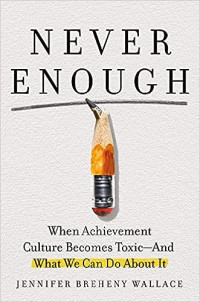Each fall, many teenagers starting their senior 12 months of highschool embark upon the fraught ritual of submitting their faculty functions.
However the preparation for this often-distressing ceremony of passage begins lengthy earlier than that. All through childhood, kids and their mother and father absorb a way of strain from American tradition that they have to be always targeted on educational achievement and long-term skilled success in a world with few alternatives. With this mindset, many kids develop as much as measure their self-worth with their variety of accomplishments in class or accolades from extracurricular actions.
In her new e-book, By no means Sufficient: When Achievement Tradition Turns into Poisonous—And What We Can Do About It, award-winning journalist Jennifer Breheny Wallace explores how the incessant push to carry out takes a toll on kids’s psychological well being. Wallace integrates the science of resilience with actual tales from kids and fogeys to spotlight methods we can assist our youngsters study that they matter past what they obtain or produce.
X

Maryam Abdullah: What proof do we now have that achievement tradition is an issue?

Jennifer Breheny Wallace
Jennifer Breheny Wallace: For many years now, researchers have been learning how antagonistic childhood experiences, resembling dwelling in poverty or amid group violence, enhance dangers to a toddler’s well being and well-being. In recent times, two nationwide coverage experiences made headlines for finding a gaggle of “at-risk” kids on the different finish of the financial spectrum.
A 2019 report revealed by among the nation’s prime developmental scientists on the Nationwide Academies of Sciences, Engineering, and Drugs added youth in “high-achieving colleges” to their record of at-risk teams, together with youngsters dwelling in poverty and foster care, current immigrants, and people with incarcerated mother and father. The report famous “comparatively excessive ranges of adjustment issues, seemingly linked with long-standing, ubiquitous pressures to excel at teachers and extracurriculars.”
A 2018 report by the influential public well being and coverage specialists on the Robert Wooden Johnson Basis (RWJF) had come to an identical conclusion when it named the highest 4 environmental circumstances negatively impacting adolescent wellness. Amongst them had been poverty, trauma, discrimination, and “extreme strain to excel.” Based on the RWJF report, a “household and/or college surroundings characterised by excessive strain to succeed or to outdo everybody else—usually, however not completely, occurring in particularly prosperous communities—can have an effect on youth in considerably deleterious methods, together with inflicting excessive ranges of stress and nervousness or alcohol and drug use and dependence.”
The vast majority of these college students come from households throughout the roughly prime 20 to 25% of family incomes, a greenback quantity that varies relying on the place you reside and the way huge your loved ones is, however an earnings degree that roughly begins round $130,000. After all, not all college students attending these aggressive colleges are struggling, however these two necessary experiences made it clear {that a} disproportionately excessive variety of these college students are experiencing detrimental well being outcomes, like nervousness, despair, and substance use problems, in comparison with their middle-class friends.
MA: What did you discover in your reporting?
JBW: With the assistance of a researcher from Baylor, I performed a survey of 18 to 30 12 months olds to search out out what they need their mother and father had recognized about their college years. A lot of the coed information pointed to the assumption that they thought their mother and father “valued and appreciated” them extra in the event that they had been profitable in class—70% of scholars agreed with that assertion. Greater than 50% went as far as to say their mother and father beloved them extra after they had been profitable, with 25% of scholars saying they believed this “quite a bit.”
So, once we speak about strain, perfectionism, nervousness, despair, and loneliness in youngsters, what we’re actually speaking about is an unmet have to really feel valued unconditionally, away from exterior achievements. The “strain” our youngsters are feeling is that they really feel their value is contingent on their achievement.
MA: You write that poisonous achievement tradition is fueled by mother and father’ nervousness about their kids’s unsure future. What are some financial and social traits that contribute to this?
JBW: Critics of recent parenting usually say that we convey this stress and nervousness on ourselves, that oldsters are simply pushing youngsters too arduous, dwelling vicariously by them, too targeted on a slender definition of feat. However what I discovered in talking with economists is that at the moment’s intensive parenting isn’t a private alternative that particular person households make of their dwelling rooms.
Dad and mom are responding to actual structural circumstances which have been mounting for many years and making an attempt as greatest they will to adapt to some fairly extraordinary financial modifications. With excessive inequality, the crush of the center class, globalization, and hypercompetition, mother and father concern that with out their intense steering and push, their kids might find yourself on the improper facet of the financial divide. With rising inequality, childhood is not seen as a separate time from maturity however as a substitute as a coaching floor to organize them for a really aggressive, unknown future.
My mother and father and (I wager) your mother and father weren’t mendacity awake at evening worrying a few drop from an A to a principally B pupil. The hands-off, extra relaxed permissive mother and father that we grew up with within the early Nineteen Seventies had been changed by a roll-up-your-sleeves era of intensive mother and father who now single-handedly wanted to verify their youngsters would land on the precise facet of the financial divide. So-called helicopter mother and father swooped in not a lot out of particular person conviction, however out of the necessity to buffer kids in opposition to unpredictable market forces. In different phrases, these pressures our youngsters are feeling are a lot greater than anyone household, college, or group.
Dad and mom really feel trapped by the expectations round childhood at the moment. With the help of a researcher on the Harvard Graduate Faculty of Training, I surveyed 6,500 mother and father. I requested them how a lot they agreed or disagreed with statements like: “I really feel accountable for my kids’s achievement and success”; 75% of oldsters strongly or considerably agreed with that assertion.
Once I requested how many individuals agreed with the assertion “I want at the moment’s childhood was much less disturbing for my youngsters,” 87% of oldsters strongly or considerably agreed.
MA: How can we defend kids in opposition to the stress, nervousness, despair, and loneliness they’re feeling?
JBW: Mattering—understanding that you simply matter to others and that you may add significant worth to the world—is the story we inform ourselves about how a lot we’re valued by these round us. Many years of analysis discover that mattering expresses the deep human want all of us need to really feel seen, cared for, and understood by these round us.
Mattering happens in life’s huge moments, like being celebrated with heartfelt toasts by individuals who know and worth you. It’s present in on a regular basis moments too, like while you’re sick and a buddy brings over a pot of selfmade soup. The sensation that hits you while you open the door is mattering.
However at the moment we face a mattering deficit, with report charges of loneliness, nervousness, and despair amongst our nation’s youth. Analysis means that as many as one-third of adolescents within the U.S. don’t consider they matter to others of their communities. After we don’t really feel like we matter, we will flip inward: We quit, drink or use medicine to flee, and self-harm. An absence of mattering, research discover, is a robust predictor of psychological well being struggles, substance abuse, and even suicide.
To matter, we have to really feel valued however we additionally want the chance to meaningfully add worth to others. Figuring out the right way to add worth to others is on the root of the Mattering Motion, a nonprofit I cofounded. The extra we add worth to others, the extra we really feel valued—a wholesome, interdependent cycle that protects our psychological well being.
MA: What is step one to fostering our youngsters’ sense of mattering and resilience?

Portfolio, 2023, 320 pages.
JBW: Previously, psychologists curious about serving to struggling kids targeted on particular interventions, telling mother and father what they need to and shouldn’t do. But it surely seems that what makes the largest impression to assist a struggling youngster is to verify the adults in that youngster’s life are psychologically wholesome and that they’ve sturdy, dependable sources of help. In different phrases: To assist the kid, first assist the caregiver.
As resilience researcher Suniya Luthar has put it: Dad and mom are “first responders” to our youngsters’ struggles, and paying fixed consideration to their rollercoaster emotions and social and educational pressures can take a toll. All of the methods we’re overstretched—work deadlines, monetary anxieties, assembly our youngster’s each want—can deaden our capacity to be delicate, responsive mother and father and make us much less attuned to our youngsters’s emotional cues. The chance right here is that our youngsters can misread our stress and impatience: They internalize the assumption that one thing have to be improper with them. A sense of not mattering, researchers be aware, is commonly rooted in small actions that accumulate every day.
Youngsters don’t want mother and father who take self-sacrifice to the acute. They want mother and father who’ve the bandwidth and perspective to name out the unhealthy values of feat tradition for the threats they’re. It appears counterintuitive. However to take care of our youngsters we should first take care of ourselves, as a result of a toddler’s resilience rests on a mother or father’s resilience.
MA: You argue that underlying numerous the strain mother and father and children really feel is the belief that “a very good life is secured by admission to a ‘good’ faculty”? Why ought to mother and father think about rejecting this premise?
JBW: After all, life expertise permits adults the attitude to know this isn’t true: Everyone knows loads of individuals who went to prime faculties whose lives didn’t end up as they’d hoped, and we all know loads of individuals who went to much less selective faculties whose lives turned out even higher than they’d imagined.
There are higher predictors of future well-being than attending a “good” faculty. Gallup and Purdue College teamed as much as conduct the most important examine of faculty graduates in U.S. historical past, surveying greater than 30,000 faculty graduates to measure 5 key dimensions of their well-being: function (how motivated had been they to realize objectives?), social (did they’ve sturdy, supportive relationships?), bodily (had been they in good well being?), monetary (had been they successfully managing their funds?) and group (did they’ve a way of belonging?).
What the researchers discovered was that the status of the school they’d attended and whether or not it was extremely selective or not selective, public or personal, small or massive “hardly mattered in any respect to their present well-being and their work lives.” Nonetheless, what did impression later life success was a pupil’s expertise whereas they had been at that faculty. The examine discovered six key kinds of faculty experiences that had an outsized constructive affect on future success:
- Taking a course with a professor who made studying thrilling;
- Having a professor who cared about you personally;
- Having a mentor who inspired you to pursue private objectives;
- Engaged on a significant undertaking throughout semesters;
- Taking part in an internship;
- Being energetic in extracurricular actions.
In different phrases, these college students who went on to have better happiness, profession, and monetary success felt valued on campus by college and their classmates and had a chance so as to add significant worth again by internships and tasks. Or, merely put: These college students loved a excessive degree of mattering.
MA: How else can we assist kids who’re struggling amid achievement tradition?
JBW: William Damon, a Stanford College professor and knowledgeable in human growth, instructed me that younger individuals at the moment are burdened and anxious not essentially as a result of we’re overworking them however as a result of they don’t know what all their efforts are for. Too usually, we fail to assist our younger individuals perceive a “why” that’s better than touchdown a spot at school or constructing their resumes—a “why” for his or her function on this planet. After we do that, we really deny them the discharge valve to this strain cooker they’re dwelling in.
Including worth to others is an underutilized device that may assist our college students fight emotions of vacancy, nervousness, and disengagement that so many are feeling at the moment. As Damon notes, “The largest downside rising up at the moment is just not really stress, it’s meaninglessness.”
Damon gives mother and father some steering for serving to youngsters discover their function:
- Hear for sparks of curiosity after which fan these flames.
- As guiding questions: What points on this planet are hitting them the toughest?
- Ask your kids to contribute in significant methods to the household regularly.
- Discuss your individual function along with your youngsters.
- Introduce kids to potential mentors who can assist them construct this sense of function.
After we encourage our youngsters to overly deal with themselves and construct their resumes, we crowd out actions that had been as soon as marked necessary by society, like caring about others. To boost a era that can maintain society sturdy and wholesome and to guard our youngsters’s psychological well being, kids want adults of their lives to assist them zoom out and see the larger world and their function in it.






























































